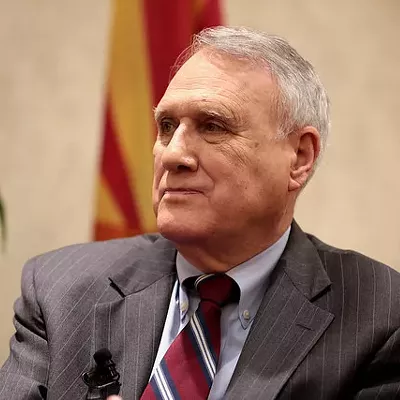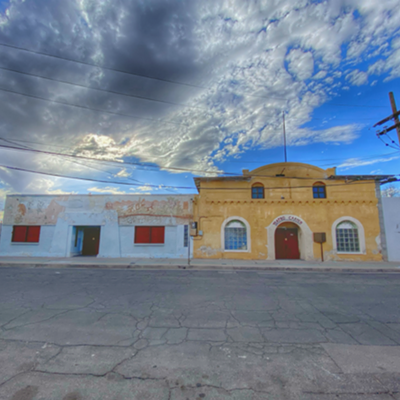"Kyl voted for amnesty," the conspiratorial voice intones. "Kyl voted against an English requirement, against tougher penalties for hiring undocumented workers--even against more border enforcement. Jon Kyl has accomplished nothing on immigration; now he's attacking Jim Pederson just to get re-elected."
They're largely negative. They're often ugly, and they've been saturating the airwaves for what seems like an eternity: They're the political ads in the long, hard-fought U.S. Senate race between incumbent Kyl and Democratic challenger Pederson.
Pederson has attacked Kyl on a number of fronts--including immigration, raising the minimum wage and the Iraq war--in order to create a sharp contrast between the candidates. Kyl has been responding with TV spots featuring photos and video of his opponent that are just as simian and unflattering as the Republican appears in Pederson's ads. Meanwhile, both sides have been accused by Annenberg Political Fact Check of distorting facts to suit their purposes.
The ads are probably more important to Pederson, because he has to grab the attention of voters in a way that Kyl doesn't. Yet his PR efforts have perhaps been a bit unfocused, with his campaign throwing everything but the kitchen sink at Kyl in an effort to see what will stick, according to Arizona State University pollster and political science professor Bruce Merrill.
"My own feeling, for what it's worth, is that it seems that he kind of had too many messages out there, as opposed to having a clear message as to why people in Arizona should vote for him rather than Kyl," Merrill said. "Remember, when you have an incumbent in the race, the basic issue is: Did the incumbent do a good enough job to stay in office?"
There's just not that much separating the candidates in the minds of voters, Merrill continued, and all of Pederson's attempts to define himself seem not to have changed that perception.
"Just with my friends and just with talking to people--I gave a speech to a couple hundred people the other day--I've asked them, 'Tell me where you think Kyl and Pederson are different,'" he said. "And it was really hard for anybody to really come up with very much. It's like a marketing campaign: If you can't really tell people why you're different and why they should vote for you instead of the other person, then you're not going to be successful."
Andy Chasin, spokesman for the Kyl campaign, said his boss wasn't available for a phone interview. Chasin didn't respond to four subsequent calls seeking comment.
According to the Federal Election Commission, Pederson has spent more than $7 million out of a total of about $12.5 million laid down by both candidates in what many are calling Arizona's most expensive political contest ever.
With the amount of advertising Pederson has been doing, Merrill said he'd expect to see a corresponding bump in the Democrat's poll numbers. But that bump hasn't materialized; recent polls show him trailing by between 5 and 11 percentage points, with Merrill's own poll in late September indicating an 11-point gap. Still, the race is competitive, and neither candidate can afford complacency, he added.
Unsurprisingly, Pederson press secretary Mark Bergman offered a gung-ho assessment on how the Pederson campaign will make up the difference in the coming weeks. He said they're going to be hitting on a number of issues to show that Kyl "hasn't produced" for Arizonans.
"I think you're going to see us talk about a number of issues," he said. "We're going to continue to talk about the war in Iraq. We're going to talk about the failure of this administration to produce comprehensive immigration reform. We're going to talk about the failure of the Kyl-Bush administration to talk about health care in a realistic way, about how they've abandoned seniors seeking cheaper prescription drugs, and put together a program called Medicare Part D that creates a giant 'doughnut hole' for seniors where they're caught paying thousands of dollars in extra medical costs."
Pederson said he expects to maintain his current message right up to the end.
"The difference right now is that people are paying attention," he said. "We had to get the kids back in school; we had to get through Labor Day, and we had to get through our primary, and now people are really understanding that there is a hotly contested U.S. Senate race, and that there are some serious differences between Mr. Kyl and myself. They're tuning in, so we're going to be hitting it hard for the remaining 30 days.
"I'm not sure that we're ever going to lead in this race, but if we can be within a couple or three points by the time we go into Nov. 7, I think we have a darn good chance of winning."
When asked about the differences between him and Kyl, Pederson meandered through a discussion on their backgrounds.
"He comes from a different world than I do," he said. "He's been 20 years back in Washington; I've spent 20 years building a business. ... You know, I'm a business guy. I look for results. I don't look for talk--particularly tough talk--and that's all I've heard on a lot of these critical issues."
Pederson then hammered away at the issues. He accused Kyl of maintaining a "stay-the-course type of attitude" in Iraq even in the face of evidence that indicates the current policy isn't working. And he touched on the immigration issue, advocating for "comprehensive reform" that includes a guest-worker program and a "practical" way for illegal immigrants who are already here to stay.
"OK, we've got a fence," Pederson said, referring to legislation that passed Congress at the end of September authorizing the construction of a 700-mile barrier along the Mexican border. "That's going to help. But if we think that's a total answer to immigration, then we've got another thing coming."
While the two candidates duke it out over the airwaves, Merrill said attention should now shift toward getting voters to turn out on Election Day. Republicans traditionally have a knack at that, but Pederson "demonstrated that he was the first Democrat in the state of Arizona who understood the difference between registering Democrats--and particularly Hispanics in the past--and really getting them to the polls."
"I suspect that both campaigns have put a great deal of money and effort into get-out-the-vote efforts," he said. "That may really be the difference right now--what you don't see behind the scenes."







